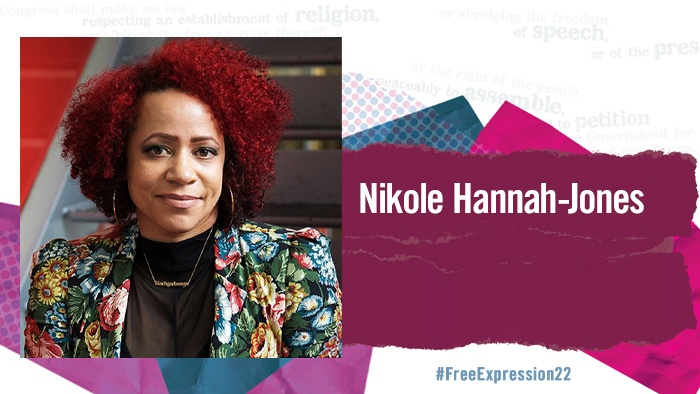Nikole Hannah-Jones: Reviving Voices Lost to History and Empowering Communities Today

We explore the impact of the 2022 Free Expression Awards honorees, including Nikole Hannah-Jones, who is Knight Chair in Race and Journalism and founder of the Center for Journalism and Democracy at Howard University and staff writer for The New York Times Magazine. These are the stories of how the First Amendment advocates we honor have used their voices to uplift others.
There’s a little-known landmark just outside Norfolk, Va., sometimes called Freedom’s Fortress.
Officially designated Fort Monroe, it’s the site of a surprising number of events and visits by famous figures from our nation’s earliest history, through the Civil War and up to its closure as an active Army base in 2011.
Step into the visitor’s center, though, and you’ll experience a lesser-known part of its past. Long before it was a lone Union outpost, it was the landing site in 1619 of a ship called the White Lion.
On board were about 20 Africans, Bantu people from present-day Angola. They were purchased by settlers of nearby Jamestown. This marked the moment slavery began in a British colony that would become part of the United States.
To commemorate the 400th anniversary of this event, one journalist set out to open the national conversation about the origins of our nation to focus on the role and impact of slavery.
The New York Times Magazine’s “1619 Project,” led by Nikole Hannah-Jones, brought this story beyond the 100,000 or so annual visitors to the landing site at Fort Monroe.
The series of essays presented the case that our democracy has been dishonest from the start, since the founding freedoms did not apply to enslaved people, and that this dissonance has had lasting impact.
The work generated praise and criticism. It earned a Pulitzer Prize and calls to ban teaching material from the 1619 Project in public schools. It even raised questions over whether to offer Hannah-Jones tenure at her alma mater, the University of North Carolina at Chapel Hill.
“I just hope that they will come to the project with an open mind, that they will read it and decide for themselves, and not let politicians or anyone else determine how they think about the project. … Whether you love the project or hate the project, we should all, as Americans, be opposed to the state trying to censor speech that it doesn’t like.” — 1619 Project creator Nikole Hannah-Jones
Walter Hussman, the namesake of UNC’s Hussman School of Journalism and Media, criticized Hannah-Jones’s interpretation of the traditional journalistic principle of objectivity, which she sees as lacking context from the experience of underrepresented communities.
In challenging longstanding interpretations of our nation, its origins and how they are presented, she raised difficult questions. Who has the power to frame our history – or our present?
“What I hope it does more than anything is lift up the work of those without whom this work would not exist.” — Nikole Hannah-Jones
Scholarship and journalism have a long history of control by gatekeepers with similar backgrounds and worldviews. Nikole Hannah-Jones noted this gap in pushing back on the academic censorship she and her work faced: “I fought this battle because I know that all across this country Black faculty, and faculty from other marginalized groups, are having their opportunities stifled.”
She isn’t new to that effort. She co-founded the Ida B. Wells Society for Investigative Reporting, based at UNC, in 2016 to create a path for more journalists of color to pursue investigative journalism.
In 1968, the Kerner Commission report on civil disorder noted the dearth of Black journalists in the industry. Ever since then, news media surveys have shown slow growth in representation.
The Wells Society provides training and mentoring because as Hannah-Jones has said, “There are a lot of journalists of color who want to be doing [investigative] reporting but don’t see a path for themselves and have never seen other journalists of color doing this job.”
Now, Hannah-Jones is continuing this work, in conjunction with the Knight Foundation, at Howard University, further growing opportunities for new voices in journalism and reviving voices that otherwise could be lost to history.
Voices like those of the people who emancipated themselves to find sanctuary at Freedom’s Fortress during the Civil War. Of the enslaved Africans whose labor built the walls of Fort Monroe. Of the African men and women who arrived in Virginia in 1619.
Between the commendations and the backlash, the conversation about ensuring freedoms for all continues.
The 2022 Free Expression Awards were April 28 at The Anthem in Washington, D.C.
Violence in Media: How (and Why) Graphic Images Make the News
Perspective: The Roe v. Wade Leak Shows the Benefit of a Free Press
Related Content
$30,000 Giving Challenge
Support the Freedom Forum’s First Amendment mission by Dec 31st and double your impact.

